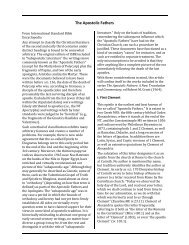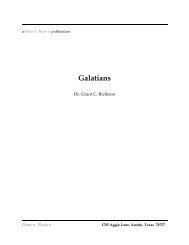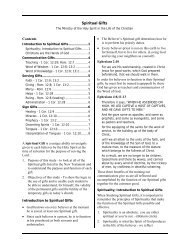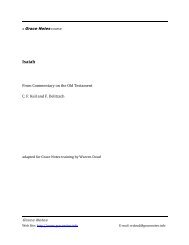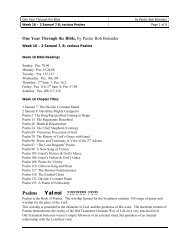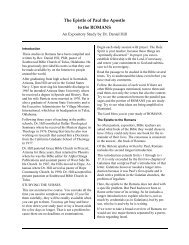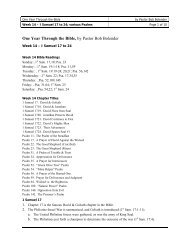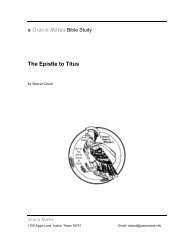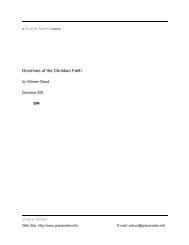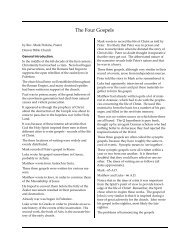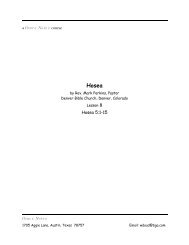Song of Solomon - Grace Notes
Song of Solomon - Grace Notes
Song of Solomon - Grace Notes
You also want an ePaper? Increase the reach of your titles
YUMPU automatically turns print PDFs into web optimized ePapers that Google loves.
SONG OF SOLOMON Page 31By C. F. Keil and F. Delitzscha <strong>Grace</strong> <strong>Notes</strong> studyThe adjuration is that love should not bedisturbed, and therefore it is by the animalsthat are most lovely and free, which roamthrough the fields. Zöckler, with whom in thisone point Grätz agrees, finds here, after theexample <strong>of</strong> Böttch. and Hitz., the earnestwarning against wantonly exciting love inthemselves (cf. Lat. irritamenta veneris, irritatavoluptas) till God Himself awakens it, and heartfinds itself in sympathy with heart. But thecircumstances in which Shulamith is placed illaccord with such a general moralizing. Theadjuration is repeated, 3:5; 8:4, and whereverShulamith finds herself near her beloved, as sheis here in his arms. What lies nearer, then, thanthat she should guard against a disturbance <strong>of</strong>this love-ecstasy, which is like a slumberpenetrated by delightful dreams? Instead <strong>of</strong>should be more exactly ,ּתְׁ עורֲ רּו and ,ּתָ עִ ירּו ,אֶּ תְׁ כֶּ םthe words עֵ רְׁ נָ ה ,אֶּ תְׁ כֶּ ן ,ּתָ and עורֵ רְׁ נָ ה ;ּתְׁ but thegram. distinction <strong>of</strong> the genera is in Heb. notperfectly developed. We meet also with thevery same synallage generis, without thisadjuration formula, at 5:8; 7:1; 4:2; 6:8, etc.; it isalso elsewhere frequent; but in the <strong>Song</strong> itperhaps belongs to the foil <strong>of</strong> the vulgar givento the highly poetic. Thus also in the vulgarArab. the fem. forms jaḳtulna, taḳtulna,corresponding to קְׁ טֹלְׁ נָ ה ,ּתִ are fallen out <strong>of</strong> use.With ,העיר expergefacere, there is connected the,עורר idea <strong>of</strong> an interruption <strong>of</strong> sleep; withexcitare, the idea, which goes further, <strong>of</strong>arousing out <strong>of</strong> sleep, placing in the full activity<strong>of</strong> awakened life. The one adjuration is, thatlove should not be awakened out <strong>of</strong> its sweetdream; the other, that it should not bedisturbed from its being absorbed in itself. ThePasek between תעירו and the word followinghas, as at Lev. 10:6, the design <strong>of</strong> keeping thetwo Vavs distinct, that in reading they might notrun together; it is the Pasek which, as Ben Ashersays, serves “to secure to a letter itsindependence against the similar one standingnext it.” הָ אַ הֲ בָ ה is not abstr. pro concreto, butlove itself in its giving and receiving. Thuscloses the second scene <strong>of</strong> the first act:Shulamith lies like one helpless in the arms <strong>of</strong><strong>Solomon</strong>; but in him to expire is her life; to havelost herself in him, and in him to find herselfagain, is her happiness.The Mutual Seeking and Finding <strong>of</strong> the Lovers—Ch. 2:8–3:5First Scene <strong>of</strong> the Second Act, 2:8–17With 2:8 the second act begins. The so-calledslumber-song (<strong>Song</strong> 3:5) closes it, as it did thefirst act; and also the refrain-like summons tohasten to the mountains leaves no doubtregarding the close <strong>of</strong> the first scene. Thelocality is no longer the royal city. Shulamith,with her love-sickness, is once more at home inthe house which she inhabits along with herown friends, <strong>of</strong> whom she has already (<strong>Song</strong>1:6) named her brothers. This house standsalone among the rocks, and deep in themountain range; around are the vineyardswhich the family have planted, and the hillpastureson which they feed their flocks. Shelongingly looks out here for her distant lover.8 Hark, my beloved! lo, there he comes!Springs over the mountains,Bounds over the hills.9 My beloved is like a gazelle,Or a young one <strong>of</strong> the harts.Lo, there he stands behind our wall!He looks through the windows,Glances through the lattices.קול in the expression ,קול <strong>Song</strong> 2:8. The wordis to be understood <strong>of</strong> the call <strong>of</strong> the ,דודִ יapproaching lover (Böttch.), or only <strong>of</strong> thesound <strong>of</strong> his footsteps (Hitz.); it is aninterjectional clause (sound <strong>of</strong> my beloved!), inwhich kōl becomes an interjection almost thesame as our “horch” [“hear!”]. Vid., under Gen.sharpens it, as the demonst. ce הִ נֵ ה after זֶּ ה 4:10.in ecce = en ce. בָ א is though <strong>of</strong> as partic., as isevident from the accenting <strong>of</strong> the fem. אָ ה ,בָ e.g.,Jer. 10:22. דִ לֵ ג is the usual word for springing;the parallel פֵ ץ) קָ פַ ץ ,(קִ Aram. פַ ז ,קְׁ פַ ץ ,קְׁ signifies



